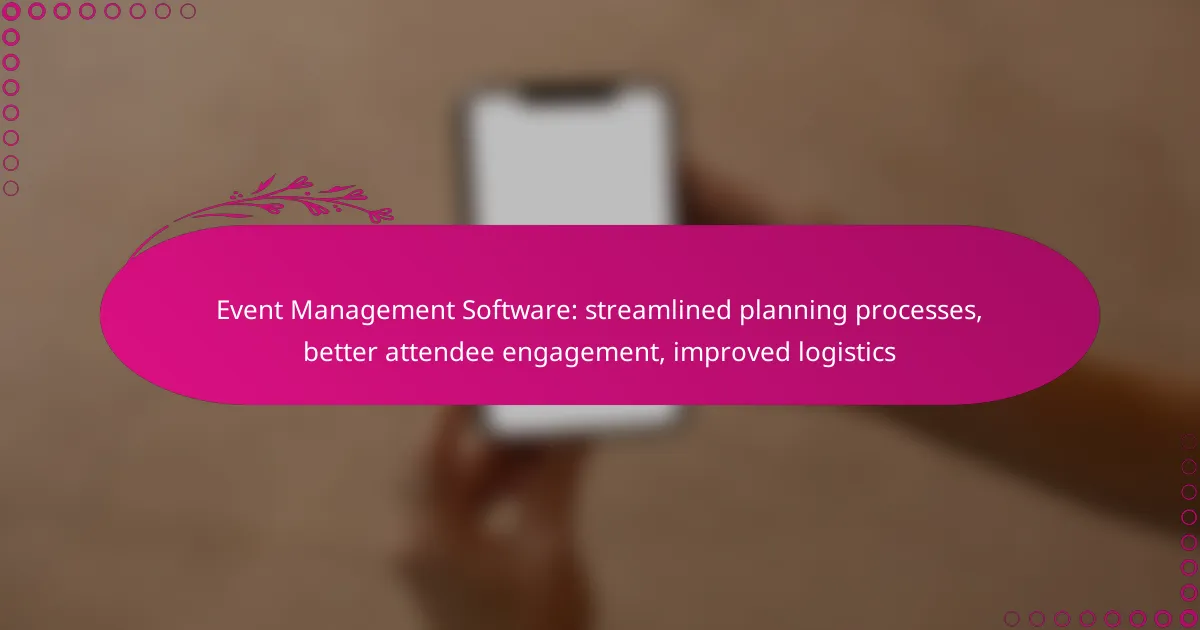Event management software revolutionizes the planning process by automating repetitive tasks and enhancing communication, allowing teams to concentrate on strategic elements. By improving attendee engagement, it fosters connections and increases satisfaction, ultimately driving event success. Additionally, it streamlines logistics through centralized information and real-time tracking, ensuring efficient operations and optimal resource management.
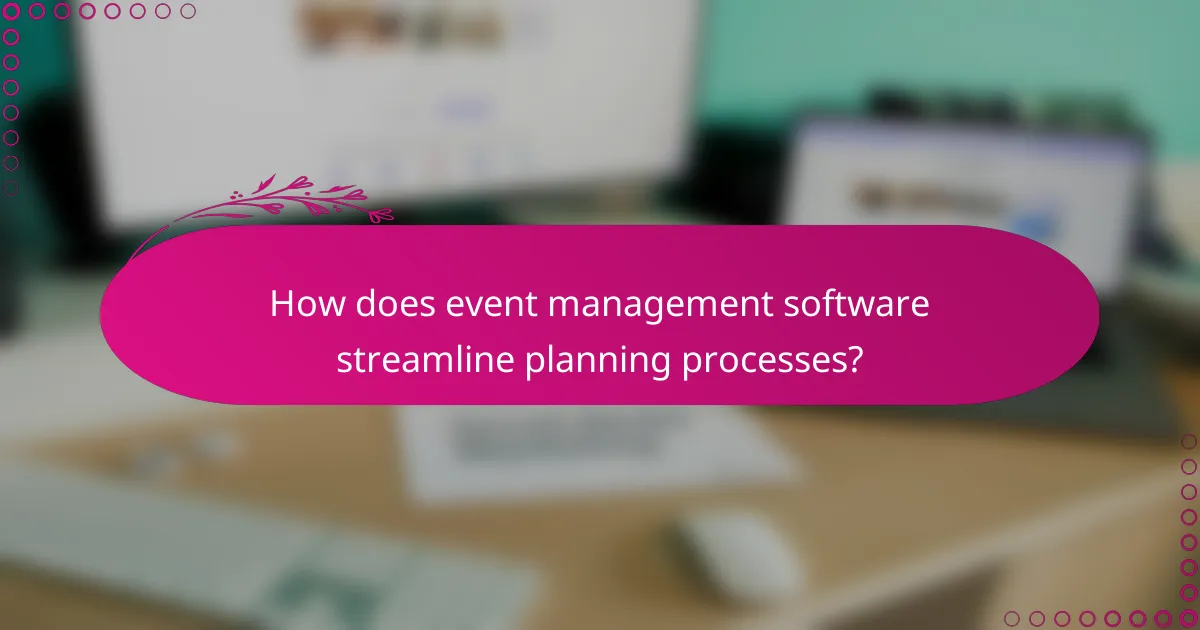
How does event management software streamline planning processes?
Event management software simplifies planning processes by automating repetitive tasks, enhancing communication, and providing tools for effective task management. This leads to more organized events and allows teams to focus on strategic aspects rather than administrative details.
Automated scheduling tools
Automated scheduling tools help event planners set dates and times efficiently, reducing the back-and-forth communication often required for availability. These tools can integrate with participants’ calendars, allowing for real-time updates and minimizing scheduling conflicts.
For example, tools like Doodle or Calendly can automatically suggest optimal meeting times based on attendee availability. This feature saves time and ensures that all key stakeholders are on the same page regarding event timelines.
Centralized communication platforms
Centralized communication platforms consolidate all event-related discussions in one place, making it easier for teams to collaborate. These platforms often include chat features, file sharing, and updates, reducing the need for lengthy email threads.
Using tools like Slack or Microsoft Teams, teams can create channels specific to different events or tasks, ensuring that relevant information is easily accessible. This approach enhances transparency and keeps everyone informed about changes or updates.
Task management features
Task management features allow event planners to assign responsibilities, set deadlines, and track progress in real-time. This ensures that all team members are aware of their roles and can prioritize their work effectively.
Software like Asana or Trello provides visual boards and lists to manage tasks, making it easy to see what needs to be done at a glance. Regular check-ins on task completion can help avoid last-minute rushes and ensure a smoother planning process.
Integration with calendars
Integration with calendars is crucial for keeping all participants informed about event schedules and deadlines. Event management software can sync with popular calendar applications, allowing for automatic updates and reminders.
This feature helps attendees stay organized and reduces the likelihood of missed appointments or events. For instance, when an event date changes, updates can be automatically reflected in all synced calendars, ensuring everyone is aware of the new schedule.
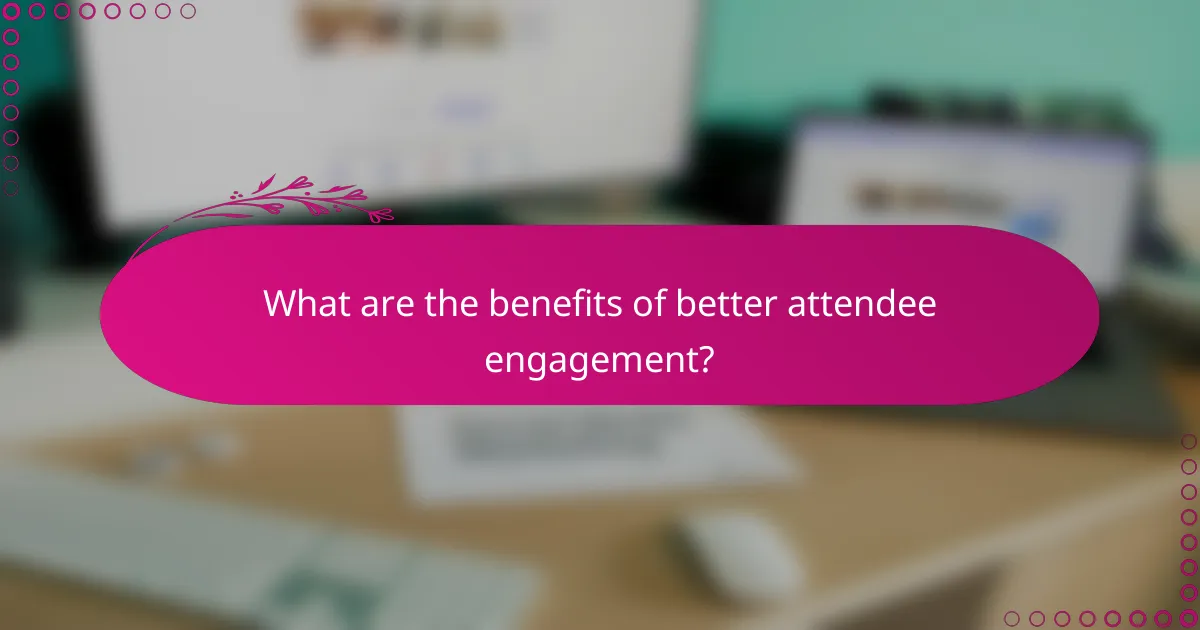
What are the benefits of better attendee engagement?
Better attendee engagement enhances the overall event experience, leading to increased satisfaction and participation. Engaging attendees effectively can foster connections, encourage feedback, and ultimately drive event success.
Personalized event experiences
Personalized experiences cater to individual attendee preferences, making them feel valued and understood. Event management software can collect data on attendee interests and behaviors, allowing organizers to tailor content, sessions, and networking opportunities.
For example, using registration data, organizers can suggest relevant sessions or workshops, enhancing the likelihood of participation. This customization can lead to higher satisfaction rates, as attendees are more likely to engage with content that resonates with them.
Real-time feedback collection
Collecting feedback in real-time allows organizers to make immediate adjustments to improve the event experience. Tools integrated into event management software can facilitate quick surveys or polls during sessions, gathering insights on topics such as speaker effectiveness or session relevance.
Implementing real-time feedback mechanisms can increase attendee satisfaction by addressing concerns as they arise. For instance, if a session is not resonating, organizers can adjust the agenda or provide additional resources to enhance engagement.
Interactive networking opportunities
Interactive networking opportunities encourage attendees to connect and collaborate, fostering a sense of community. Features such as matchmaking algorithms can pair attendees with similar interests or goals, enhancing the networking experience.
Additionally, incorporating activities like live Q&A sessions or discussion forums can stimulate interaction. These opportunities not only facilitate valuable connections but also increase overall event engagement, as attendees feel more involved and invested in the experience.
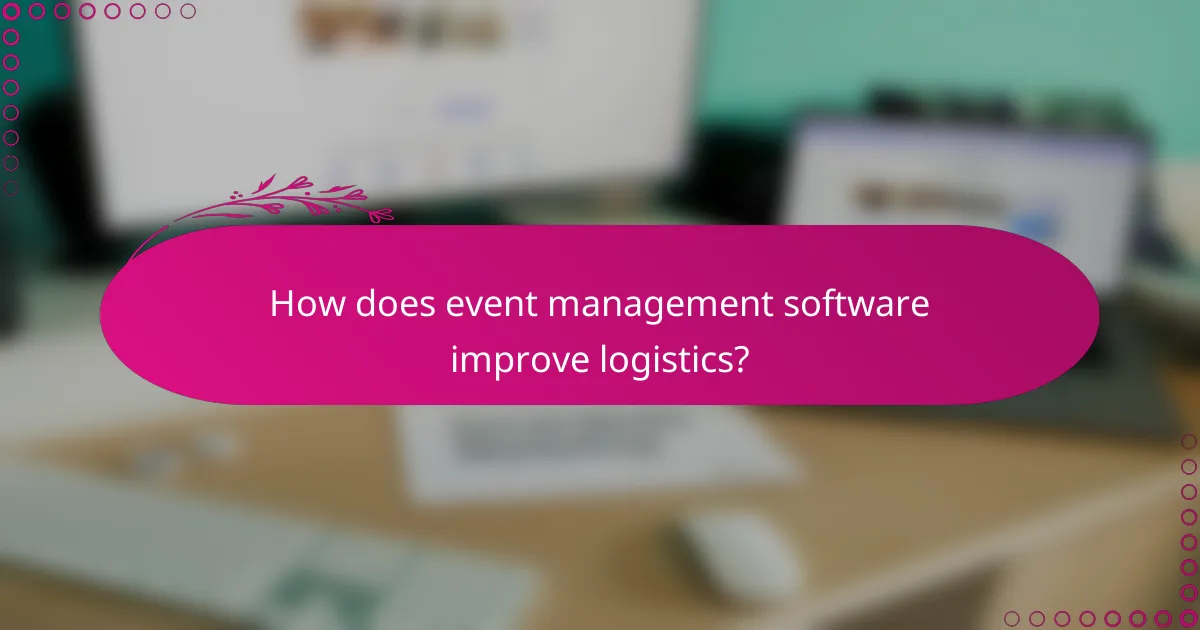
How does event management software improve logistics?
Event management software enhances logistics by streamlining various processes involved in planning and executing events. It centralizes information, automates tasks, and enables real-time tracking, which leads to more efficient operations and better resource management.
Resource allocation tracking
Resource allocation tracking allows event planners to monitor the distribution and usage of materials, personnel, and finances throughout the event lifecycle. By utilizing software tools, planners can easily visualize resource availability and adjust allocations as needed, ensuring optimal utilization.
For instance, planners can set up alerts for low inventory levels of essential supplies, helping to avoid last-minute shortages. This proactive approach can save both time and money, as it reduces waste and enhances overall efficiency.
Vendor management solutions
Vendor management solutions within event management software facilitate the coordination and communication with various suppliers and service providers. These tools help planners keep track of contracts, payments, and performance metrics, ensuring that all vendors meet their obligations.
Using a centralized platform, planners can compare vendor offers and select the best options based on cost and service quality. This can lead to significant savings, as well as improved relationships with vendors through clear communication and timely payments.
On-site check-in systems
On-site check-in systems streamline the attendee arrival process, reducing wait times and enhancing the overall experience. These systems often utilize QR codes or mobile apps, allowing for quick scanning and verification of attendee information.
Implementing an efficient check-in process can significantly improve attendee satisfaction. For example, using self-service kiosks can minimize queues and free up staff to assist with other logistical tasks, ensuring a smooth event flow.
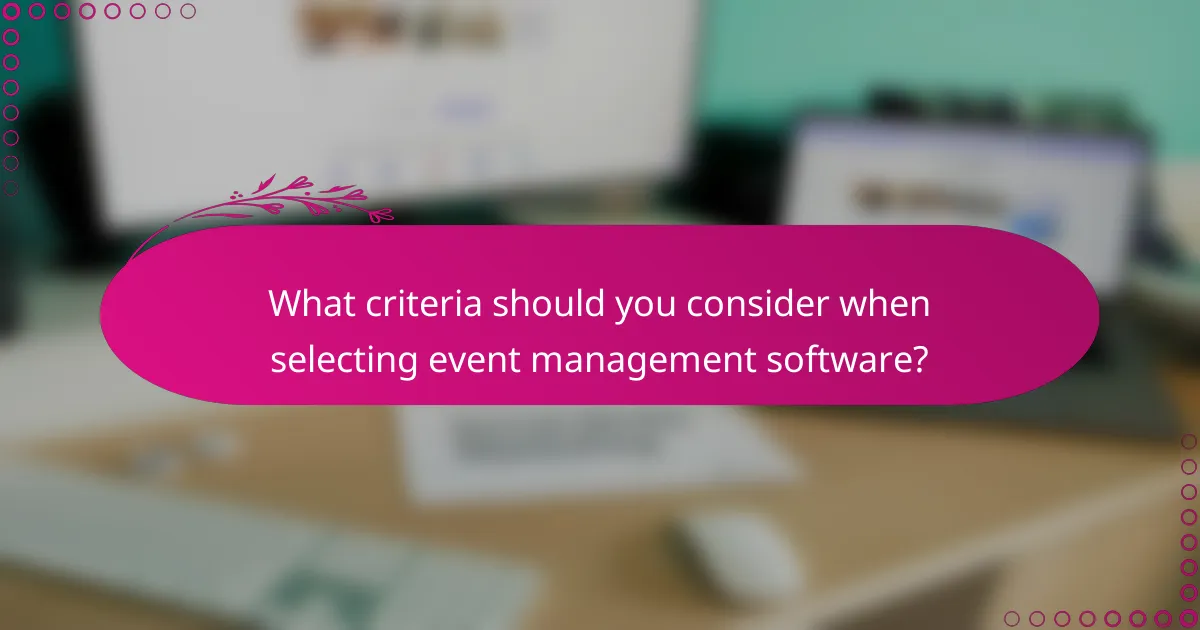
What criteria should you consider when selecting event management software?
When selecting event management software, consider integration capabilities, user interface and experience, and pricing models. These criteria will help ensure that the software meets your specific needs and enhances your event planning process.
Integration capabilities
Integration capabilities refer to how well the software connects with other tools and platforms you use, such as CRM systems, payment processors, and marketing software. Look for solutions that offer seamless integration to streamline your workflow and avoid data silos.
For example, if you use a popular email marketing service, ensure the event management software can sync attendee data automatically. This feature saves time and reduces the risk of errors in data entry.
User interface and experience
The user interface and experience of the software are crucial for both event planners and attendees. A clean, intuitive design facilitates easier navigation and reduces the learning curve for users.
Consider testing the software through demos or free trials to assess its usability. Pay attention to features like mobile responsiveness, as many attendees will access event information on their smartphones.
Pricing models
Pricing models for event management software can vary significantly, including subscription-based, one-time fees, or pay-per-event structures. Evaluate which model aligns best with your budget and expected usage.
Some platforms may offer tiered pricing based on features, so consider what functionalities are essential for your events. Always check for hidden fees, such as transaction costs or additional charges for premium features, to avoid surprises later on.
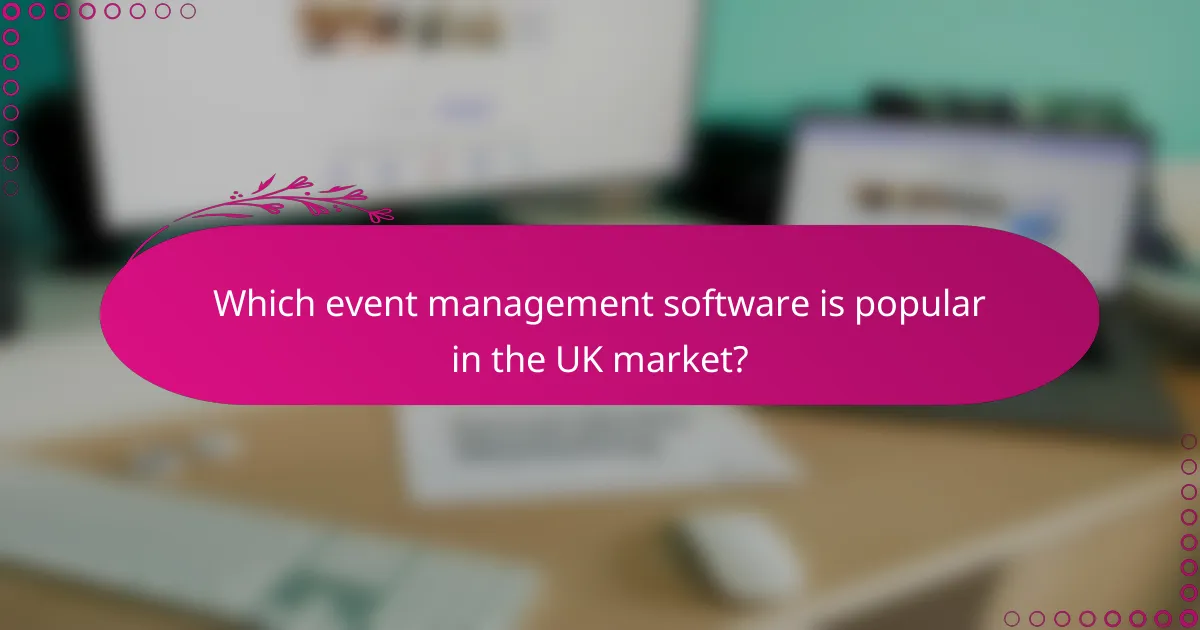
Which event management software is popular in the UK market?
In the UK market, Cvent and Eventbrite are among the most popular event management software options. These platforms streamline planning processes, enhance attendee engagement, and improve logistics for various types of events.
Cvent
Cvent is a comprehensive event management platform that offers tools for event registration, venue selection, and attendee engagement. It is particularly favored by corporate event planners due to its robust features that support large-scale events.
When using Cvent, consider its pricing structure, which can vary based on the features you select. For instance, the software can accommodate events ranging from small meetings to large conferences, making it versatile for different organizational needs.
To maximize Cvent’s potential, ensure you utilize its analytics tools to track attendee engagement and gather feedback post-event. This data can help refine future events and improve overall attendee satisfaction.
Eventbrite
Eventbrite is an accessible platform that simplifies the process of creating, promoting, and managing events. It is particularly popular for smaller events, such as workshops and community gatherings, due to its user-friendly interface and straightforward pricing.
Eventbrite allows event organizers to set up ticketing options, including free and paid tickets, with minimal setup time. This flexibility makes it an attractive choice for those looking to host events without extensive technical knowledge.
For effective use of Eventbrite, leverage its promotional tools, such as social media integration and email marketing features, to reach a broader audience. Additionally, monitor ticket sales and attendee demographics to tailor your marketing efforts accordingly.
